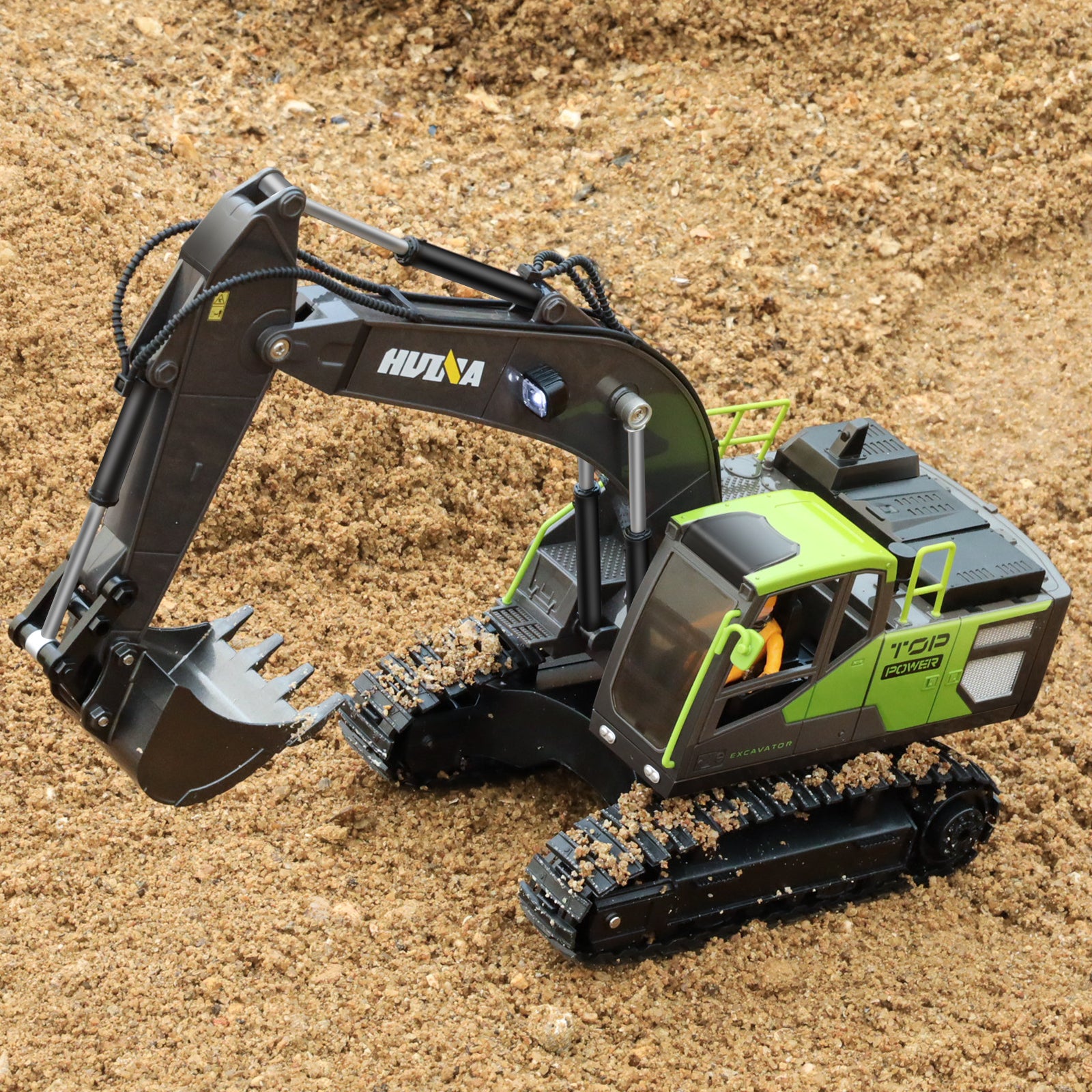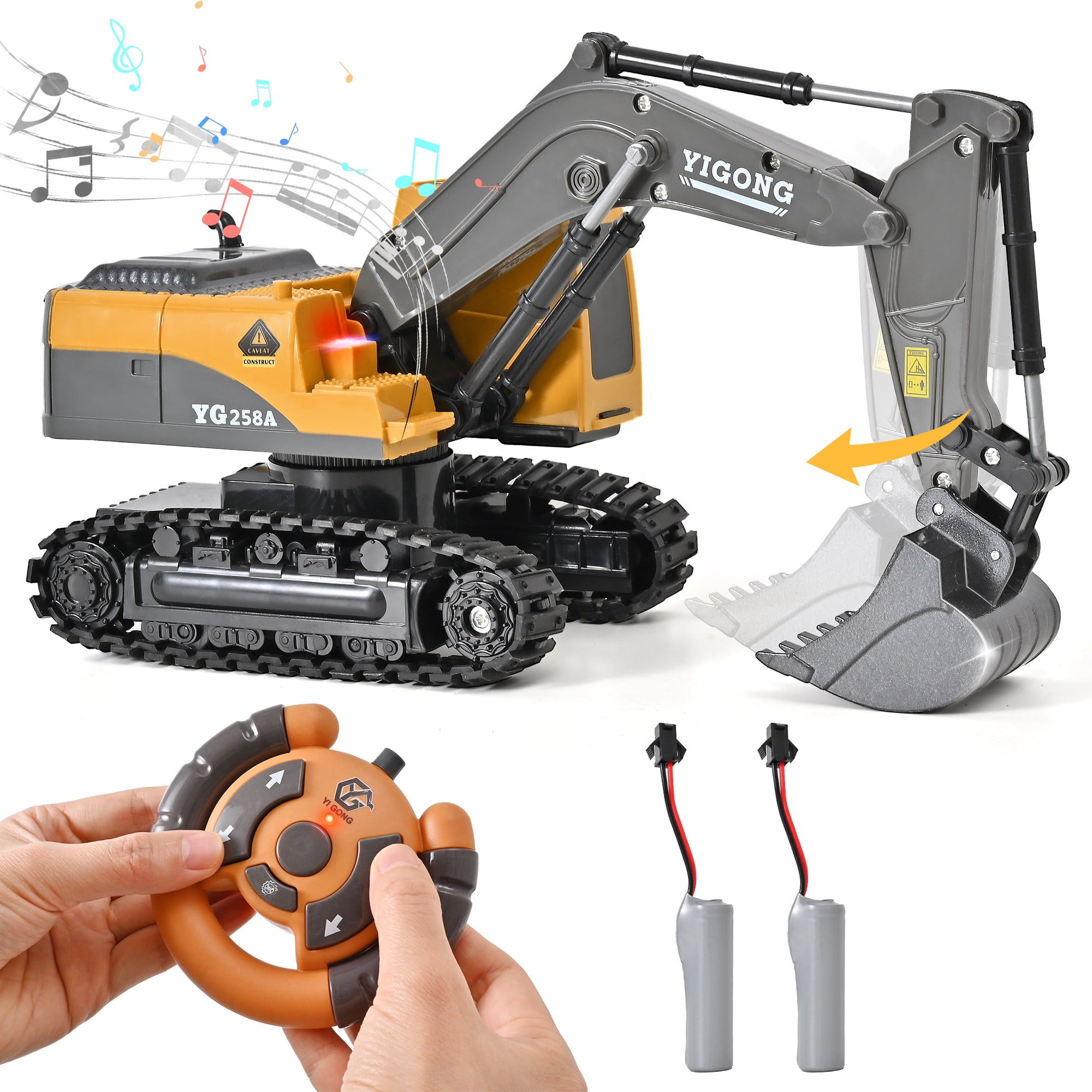Why the remote control excavator Is Ideal for Tight Spaces in Construction
Understanding Exactly How Excavator Works and Its Impact on Efficiency
Excavators play a vital function in construction and mining operations, counting on a complex interaction of hydraulic and mechanical systems. Their capacity to carry out a selection of jobs hinges on both their layout and the modern technology integrated within. Understanding these elements can significantly influence operational efficiency and efficiency. As innovations remain to reshape the market, one should think about exactly how these changes will certainly affect future techniques and efficiency.
The Fundamentals of Excavator Mechanics

The Duty of Hydraulic Systems in Excavators
At the heart of excavator operation exists the hydraulic system, which plays a crucial role in powering the machine's activities and features. This system utilizes pressurized hydraulic fluid to transfer power, enabling different activities such as excavating, moving, and training. By using the concepts of hydraulics, excavators can execute jobs with impressive accuracy and force, improving overall operational efficiency.The hydraulic system consists of key components, including cylinders, pumps, and shutoffs, which collaborate to control the circulation and direction of the liquid. When the driver engages the controls, the hydraulic liquid is directed to details cyndrical tubes, converting the driver's commands right into physical motion. This mechanism permits responsive and smooth activities, which are vital in building and excavation environments. double e volvo rc excavator. The effectiveness of the hydraulic system directly affects the productivity and convenience of the excavator, making it an indispensable component in contemporary excavation processes
Key Elements of an Excavator
Understanding the vital elements of an excavator is vital for grasping just how this powerful equipment runs. An excavator consists of numerous significant aspects, consisting of the undercarriage, residence, boom, container, and arm. The undercarriage supplies stability and mobility, often including tracks or wheels to navigate different terrains. Your home includes the engine and hydraulic systems, allowing the driver to control motion and power the device. The boom extends from your home, allowing upright reach, while the arm connects to the container, assisting in digging and lifting operations.Additionally, the taxicab houses the operator, geared up with controls for exact handling. Each of these parts plays a crucial duty in the excavator's general functionality, adding to its performance and performance on construction websites. Comprehending these components aids in preserving and maximizing excavator efficiency, making sure jobs are finished securely and effectively.
Add-on Versatility and Its Advantages
Add-on convenience is a vital aspect of excavators, making it possible for drivers to switch over in between various tools tailored for specific tasks. This flexibility not just improves job performance however additionally adds to cost-effectiveness by reducing the need for numerous makers. Comprehending the different kinds of attachments offered can significantly impact the overall efficiency and capability of an excavator on task sites.
Types of Attachments
While excavators are primarily identified for their excavating abilities, their true flexibility lies in the broad array of attachments available. These add-ons boost the excavator's functionality, permitting it to do different tasks beyond excavation. Common add-ons consist of containers (for digging and scooping), hydraulic thumbs (for grasping products), and augers (for piercing holes) Grapples are utilized for handling and relocating particles, while rippers can break up hard surface areas. Various other specialized accessories, such as trenchers and rakes, make it possible for excavators to adapt to certain job demands. This diversity not only enhances the machine's energy throughout different sectors, consisting of demolition, building, and landscape design, yet also allows operators to tailor their devices to satisfy details project needs efficiently.
Boosted Work Effectiveness
Optimizing task performance is a main advantage of using numerous excavator attachments. Different accessories permit an excavator to do numerous tasks without needing to change devices, conserving valuable time and labor. For instance, utilizing a hydraulic hammer can break concrete while a pail attachment can dig deep into soil, making it possible for a seamless operations. This versatility reduces downtime related to tools modifications and boosts efficiency on-site. Additionally, specialized accessories enhance precision in jobs such as grading or landscape design, resulting in better results. The capability to adjust to numerous work needs not just improves operations however additionally reduces the requirement for extra machinery, guaranteeing that tasks are finished quickly and efficiently. Generally, accessory flexibility considerably adds to enhanced job efficiency in excavation job.
Cost-Effectiveness and Versatility
Cost-effectiveness is a considerable advantage of utilizing flexible excavator add-ons. These add-ons allow a single excavator to perform numerous jobs, minimizing the requirement for extra machinery and labor - double e volvo rc excavator. By switching between containers, hammers, and grapples, operators can tackle numerous tasks, from excavating to demolition, thus taking full advantage of equipment application. This flexibility not only decreases functional expenses but additionally decreases downtime connected with read review changing tools. Additionally, the ability to tailor excavators with specialized add-ons improves efficiency, as they can efficiently deal with varied tasks according to job demands. To wrap up, the mix of cost-effectiveness and flexibility in excavator attachments adds to improved functional effectiveness and source allocation in building and construction and excavation projects

Advanced Innovation in Modern Excavators
Modern excavators are significantly outfitted with innovative innovation that transforms excavation procedures. Automation improves operations, while boosted fuel performance lowers functional expenses. Additionally, smart control systems boost precision and safety and security, noting a substantial development in excavation equipment.
Automation in Excavation Processes
As excavation technology advances, automation has emerged as a vital part in boosting efficiency and precision on work sites. Modern excavators are geared up with sophisticated automated systems that help with jobs such as grading, excavating, and trenching with very little operator treatment. These systems make use of sensors, GPS, and machine discovering algorithms to ensure exact placing and deepness control, significantly lowering the margin for error. Furthermore, automation allows drivers to focus on critical decision-making rather than hand-operated controls, leading to enhanced performance in general. Such advancements not just improve operations but likewise improve safety and security by reducing human error in intricate procedures. As a result, the assimilation of automation in excavation processes represents a significant innovation in construction modern technology, driving the industry in the direction of greater performance and effectiveness.
Enhanced Fuel Efficiency
Improvements in modern technology have actually additionally brought about substantial renovations in fuel efficiency for contemporary excavators. Modern devices are outfitted with innovative engines that enhance power outcome while lowering gas usage. These engines use innovative burning technologies, such as turbocharging and straight gas injection, to boost efficiency and effectiveness. Furthermore, light-weight products in construction reduce overall weight, enabling for less power expense during operation. The intro of variable rate controls allows operators to change engine performance according to details jobs, even more lessening gas use. Therefore, these improvements not just reduced operational prices but additionally add to environmental sustainability by lowering emissions. On the whole, enhanced gas effectiveness in excavators is a vital advancement that reinforces productivity and financial stability in the construction industry.
Smart Control Equipment
While operators browse increasingly intricate task websites, wise control systems in excavators have arised as vital tools for improving Source efficiency and precision. These sophisticated modern technologies use formulas and sensing units to keep an eye on numerous parameters such as tons weight, terrain problems, and operational efficiency. By automatically changing hydraulic features, smart systems enhance equipment performance, bring about improved efficiency and reduced wear on elements. In addition, operators benefit from user-friendly user interfaces that provide real-time responses and learn this here now diagnostics, permitting informed decision-making. This combination of modern technology not just simplifies procedures yet likewise decreases human error, adding to much safer job atmospheres. As the building market remains to develop, clever control systems will play a vital function in forming the future of excavator effectiveness and performance.
Enhancing Operational Efficiency With Excavators
Excavators play a necessary function in boosting operational effectiveness throughout numerous construction and excavation jobs. Their flexibility enables numerous tasks, including product, training, and excavating handling, which enhances process and minimizes the demand for added tools. With powerful hydraulic systems, excavators can perform sturdy jobs with accuracy, significantly decreasing the time needed to full jobs. The integration of advanced modern technology, such as GPS and automated controls, better maximizes their operation, enabling drivers to accomplish higher accuracy and minimize product waste. Furthermore, modern excavators are developed to take in less gas and reduce discharges, adding to both cost savings and environmental sustainability. By making use of excavators efficiently, building teams can enhance performance, satisfy project deadlines, and enhance overall website management. This multifunctionality and performance make excavators vital tools in the modern-day construction landscape.
The Future of Excavators in Building And Construction and Mining Industries
As the building and mining sectors develop, the future of excavators is positioned for significant change driven by technological advancement and changing operational needs. Advances in automation and fabricated knowledge are improving excavator capacities, permitting boosted precision and effectiveness in procedures. Autonomous excavators are arising, decreasing the demand for human intervention and reducing the danger of accidents.Moreover, the assimilation of telematics and IoT technology allows real-time tracking of equipment performance and predictive maintenance, maximizing uptime. Environmentally friendly styles, including electric and hybrid versions, are acquiring grip, straightening with sustainability goals within the industry.Additionally, the usage of innovative materials and lighter designs improves fuel effectiveness while keeping efficiency criteria. As these fads development, excavators will certainly play an essential duty in meeting the enhancing demands for productivity and safety in construction and mining, eventually changing functional landscapes.
Regularly Asked Inquiries
Just How Do Weather Impact Excavator Efficiency?

Weather condition problems greatly influence excavator performance, as rain and mud can prevent grip and security, while extreme temperatures might impact hydraulic systems. Operators must adjust to these variables to guarantee excellent performance and safety throughout operations.
What Safety Steps Should Operators Comply With While Making Use Of Excavators?
Safety and security steps for excavator drivers consist of putting on proper individual safety tools, conducting pre-operation assessments, ensuring correct interaction with ground employees, maintaining a safe range from overhead threats, and adhering to well-known operational methods to stop crashes.
Just How Usually Should Excavators Be Kept for Optimal Efficiency?
Excavators must be kept on a regular basis to ensure peak efficiency, typically every 250 operating hours or as defined by the maker. Routine checks boost reliability, stop unexpected breakdowns, and extend the life expectancy of the tools.
What Is the Typical Life Expectancy of an Excavator?
The average life-span of an excavator typically ranges from 10,000 to 15,000 hours of procedure. Elements influencing durability consist of upkeep practices, operating conditions, and the quality of the machine itself, impacting overall productivity and efficiency.

Can Excavators Operate Unequal Surface Effectively?
Excavators can operate efficiently on unequal surface because of their expressed layouts and flexible tracks. These features enable them to maintain stability and traction, enabling efficient operation in challenging atmospheres frequently come across in building and construction and landscaping jobs. Each of these elements plays a crucial function in the excavator's general performance, contributing to its efficiency and effectiveness on construction sites. Taking full advantage of task effectiveness is a main advantage of utilizing various excavator attachments. While drivers browse progressively complicated job sites, clever control systems in excavators have arised as necessary devices for boosting performance and precision. Excavators play a crucial role in enhancing operational efficiency throughout various construction and excavation jobs. Developments in automation and artificial knowledge are improving excavator abilities, enabling for enhanced precision and effectiveness in procedures.